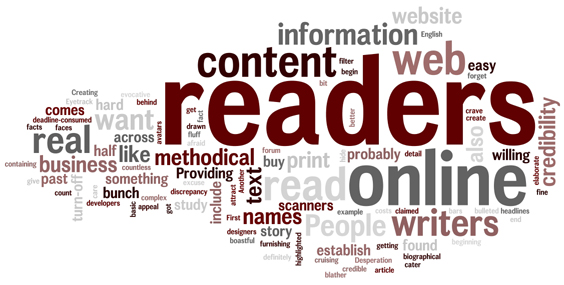Respect Your Readers
By Jason Thurston In E-commerce Basics, Opinion, Studies & StatsPeople do read online. In fact, you’re doing it right now. Many past surveys have claimed that people don’t read content online, but they do, and web content writers, designers, and developers have no excuse for furnishing pages with meaningless blather. Creating evocative text takes longer than most deadline-consumed writers are willing to spend and costs more than most business owners are willing to pay.
The 2007 Poynter Institute’s Eyetrack study found that nearly two-thirds of online readers read all the text of a particular story once they begin to read it. About half of online readers are methodical. That means they start at the beginning of a story and read word-for-word through the end. The other online readers are scanners. The study also revealed that online readers were drawn to navigation bars and teasers, while print readers preferred large photos and headlines.
The discrepancy in online readers’ preferences is problematic for web content writers in that we must appeal to both the methodical readers and the scanners.
Another survey found that web users value credibility in online content. But since readers never know who is really behind information on the web it can be hard for writers to establish credibility. Writing containing a bunch of marketing-type jargon is also a turn-off to readers. Someone cruising a business website for example, may want to buy something, but they definitely don’t want to be told to buy it.
There are a few easy ways to cater to online readers while getting your message across. First, it’s important to tailor your website to both types of online readers.
A website with scannable text should include highlighted keywords, meaningful subheadings, bulleted lists, one-idea paragraphs, and about half the word count of a print article. Don’t forget to include the detail and the fine print that methodical readers crave.
As writers, we all want to be credible. At least I hope we do. But how do we establish credibility in a forum inundated with information from countless avatars with quirky screen names? Easy. We use our real names and our real mug shots. Providing a bit of biographical information also won’t hurt. Readers respond to honesty. They relate better to real people with real names and real faces. Privacy is one thing, but for the most part, a writer who’s uncomfortable providing basic personal information is probably trying to hide something.
Lastly, let’s give our readers some respect. Most of them got past third-grade English; so don’t be afraid to elaborate a little when it comes to a complex issue or product review.
Most importantly, don’t write like a marketer. Desperation is a turn-off. The second a reader comes across a slogan like “the most intergrated” or other boastful and not-so-subtly suggestive phrases, they are turned off. Just be honest. Most readers care most about the straight, hard facts, and they don’t want to filter through a bunch of fluff to get to them.
People do read web content, but if they’re not reading yours, it’s probably because they don’t like it. Improving the quality of web content will attract more readers and create business.



No Comment